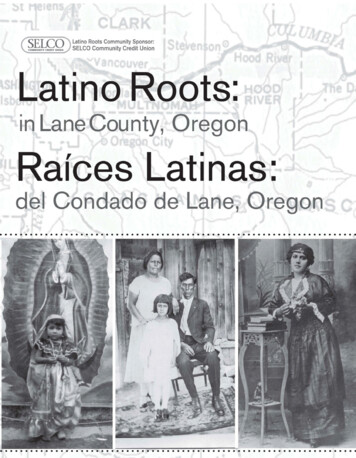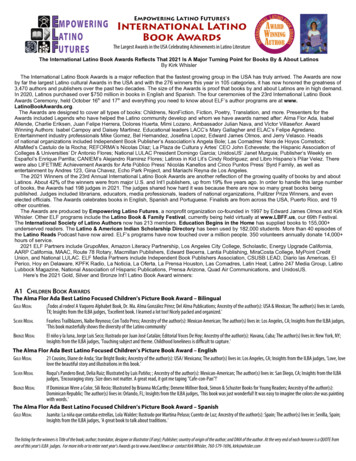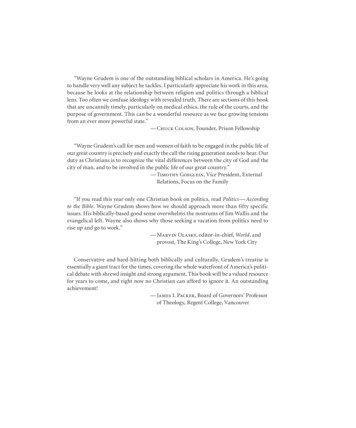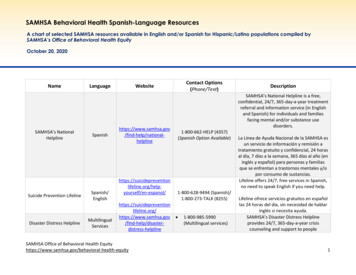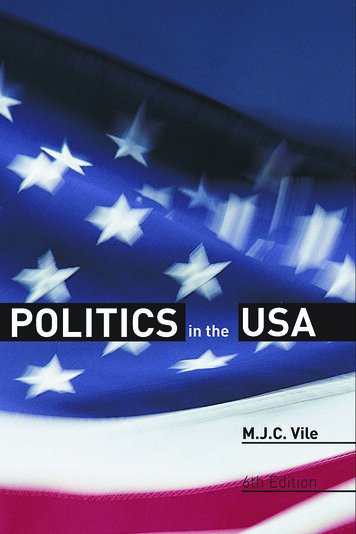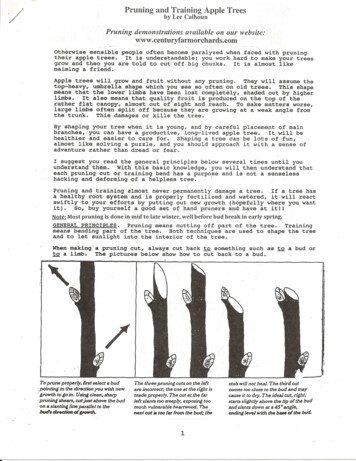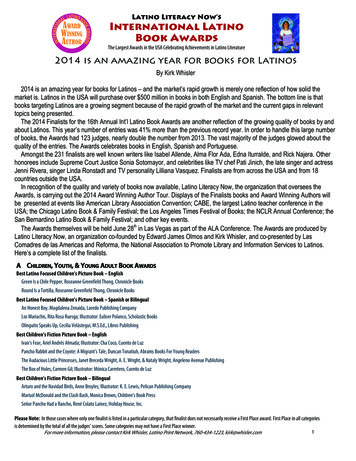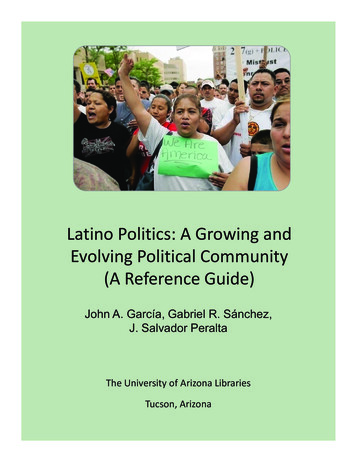
Transcription
Latino Politics: A Growing andEvolving Political Community(A Reference Guide)John A. García, Gabriel R. Sánchez,J. Salvador PeraltaThe University of Arizona LibrariesTucson, Arizona
Latino Politics:A Growing and EvolvingPolitical Community(A Reference Guide)John A. GarciaUniversity of ArizonaGabriel R. SanchezUniversity of New MexicoJ. Salvador PeraltaUniversity of West Georgia
Copyright 2009John A. Garcia, Gabriel R. Sanchez, and J. Salvador PeraltaThis work is licensed under the Creative Commons Attribution-Noncommercial-No Derivative Works3.0 United States License. To view a copy of this license, visit s/ or send a letter to Creative Commons, 171 Second Street, Suite 300, San Francisco,California, 94105, USAPublished by:The University of Arizona Libraries1510 E University Blvd, Tucson, AZ 85721-0055Tel: (520)621-6406; Fax: (520)621-9733ISBN: 1-931583-05-61. Hispanic Americans -- Social conditions -- Bibliography. 2. Hispanic Americans -- Economic conditions -- Bibliography. 3. Hispanic Americans -- Politics and government -- Bibliography. 4. Communitylife -- United States. 5. Political participation -- United States
Table of ContentsPreface: Moving from LNPS ‘89 to the LNS ‘06 – Major Latino PoliticalScience SurveysAn Initial Inquiry8Latino Politics: Both a Growing and Evolving Political Community(Retrospective Essay)Who Are They and Where Are They Going?10Group Identification and Public Life12Pan-Ethnicity and CommunityAssimilation and AcculturationWhat do Latinos Want? - Opinions and PoliciesOrganizations, Mobilization, and RepresentationForeign-born Latinos and PoliticsContext Matters for LatinosFuture Latino Research and Challenges11121313151616Chapter Two: Methodology and User GuideSelection and Organization of Relevant Conceptual Categories19Using this Bibliography Effectively23Data Collection22Chapter Three: History, Demographics, and Mass MediaLatino History - Books24Latino Demographics and SES Trends - Books43Latino History - ArticlesLatino Demographics and SES Trends - ArticlesLatinos in the Discipline - BooksLatinos in the Discipline - ArticlesLatinos in the Mass Media – BooksLatinos in the Mass Media – Articles424550505258
Chapter Four: Latino IdentityGeneral Identity - Books59Pan-Ethnic Identity - Articles86General Identity - ArticlesNational Origin Based Identity - ArticlesRacial Identity - ArticlesDiscrimination and Identity - Articles808995100Chapter Five: Books Focused on Ethnic StudiesCentral American Studies104Dominican American Studies106Cuban American StudiesMexican American StudiesChicana StudiesChicano StudiesPuerto Rican Studies105108112115121Chapter Six: Political Attitudes and Political BehaviorPolitical Attitudes and Political Behavior - Books126Partisanship and Party Identification - Articles147Political Attitudes and Public Opinion - ArticlesPolitical Participation - Articles128151Chapter Seven: Latino Elites, Representation, and InstitutionsLatino Elites, Representation, and Institutions - BooksLatino Elites, Representation, and Institutions - Articles172186Chapter Eight: Inter-group RelationsGeneral Inter-Group Relations - Books193Coalition Formation and Conflict - Books197Inter-Group Attitudes - ArticlesCoalition Formation and Conflict - Articles194200
Chapter Nine: Public Policy IssuesEconomic and Labor Policy-Books202Education - Books210Economic and Labor Policy-ArticlesEducation - ArticlesHealth Care/Health Policy - BooksHealth Care/Health Policy - ArticlesHousing / Segregation - BooksHousing / Segregation - ArticlesImmigration and Naturalization - BooksImmigration and Naturalization - ArticlesLanguage Policy - BooksLanguage Policy - ArticlesThe Criminal Justice System/Criminology - BooksThe Criminal Justice System/Criminology – ArticlesGeneral Policy Research - BooksGeneral Policy Research - Chapter Ten: Methodology and Measurement IssuesMethodology and Measurement Issues - BooksMethodology and Measurement Issues - Articles301301Chapter Eleven: Reference SourcesBibliographies307Dictionaries and Encyclopedias309Biographies and Biographical ReferencesHandbooks, Statistical Abstracts, Etc.Appendix A: Categories312Appendix B: Book Publishers313308310Appendix C: Scholarly Journals and Research Centers316
Preface: Moving from LNPS ‘89 to the LNS ‘06 – Major Latino Political Science SurveysPreface: Moving from LNPS ‘89 to the LNS ‘06– Major Latino Political Science SurveysLatinos or Hispanics now constitute the largest “minority” ethnic/racial group in the UnitedStates, and are forecast to be the primary catalyst for this nation’s population growth for the foreseeablefuture. If current trends continue, conservative projections are that Latinos may be 25 percent of the U.S.population by 2050 and 33 percent by 2100. The recent growth of this population presents unique challenges to American society, and especially to the nation’s capacity to successfully accommodate the needsand interests of Latinos as governmental institutions are called upon to educate, provide health care,employ, and politically incorporate this group.Less obvious, perhaps, are the challenges confronting Latinos themselves, who must define theirown communities, as well as their roles and responsibilities as an increasingly integral members of thelarger American polity. What it means to be Latino, and how Latinos relate to the rest of American society, varies across geographic location, reflecting differences in the size, national origin mix, and time ofarrival of local Latino populations as well as differences in the social, political and institutional contextsin which they reside. Each of these differences alters the experience of “being Latino,” even as the presence of Latinos alters the society in which they liveIf in earlier generations, single-national origin groups living in geographically and linguisticallyisolated and concentrated enclaves—in the Southwest, South Florida, or New York—predominantlycharacterized the Latino experience, but that is no longer the case. New narratives of Latino populationsmixed by generation, language dominance, and national origin, to say nothing of Latinos living in areaslike the rural South and Midwest, are creating new complexities to the Latino experience in America. Itis to these new “common” experiences of Latinos that we identify and document the systematic researchdone on the growing and evolving Latino community in America. The volume of research and theexamination of the complexities associated Latino civic and political life reflect the development of thismaturing field of inquiry. It is the purpose of this collection to chronicle these developments and facilitate active and curious “students” of Latino political life and broader exposure to this literature.An Initial InquiryIn the summer of 1984, a group of four Latino political scientists flew to New York City to meetwith officers of the Lou Harris survey firm. Their purpose was to explore the possibility of augmentingtheir 1984 Presidential election panel that was tracking public opinion and voters’ preferences with areasonable number of Latino respondents. Even at that time, there was a perspective that this growingpopulation would be playing an increasing, important role in electoral politics. During the course of thisconversation, it became abundantly clear to this research group that an expanded sample would not besufficient to explore the breadth and depth of this emerging community.Over the next four plus years, this group was involved in a research study group to identify majorconceptual and analytical issues and themes necessary to incorporate in any systematic study of Latinos.Eventually, planning funds from the Ford Foundation were appropriated to explore sampling issues related to the Latino population, inventory and assessment of the extant research literature on Latinos, anddevelopment of a survey instrument on Latino political life. The most visible product of that endeavorwas the completion of the Latino National Political Survey, 1989-1990. At the same time, that searchfor the extant research literature also produced a reference book- Latinos and Politics: A Select ResearchPage 8
An Initial InquiryBibliography published by the University of Texas Press.Now, almost twenty years later, an almost new set of Latino Political Science researchers embarked on a similar process as the Latino National Survey (LNS) group. In 2003, a small group talkedamong themselves about the long gap since a major social science survey of Latinos. The concern wasnot only based on datedness of information, but that many demographic changes that had occurred.These changes has included incredible population growth, rise of the diversity of Latino sub-groups(i.e. Central and South Americans and Dominicans), even larger segment of Latino immigrants thanbefore, geographic dispersion nationally, and greater national awareness and issues around this group. Inaddition, political developments had resulted in the growth of national advocacy organizations, increasednumbers of elected officials at all levels of government, gains economically as entrepreneurs, consumers,and members of organized labor.So over the next three years, funding was secured for planning and designing a major socialscience survey through the Hewlett Foundation. The planning phase re-examined important samplingissues and approaches, use of focus groups to explore the more salient issues and ways to develop surveyitems, and update the extant research literature. It is the latter charge that served as the basis for thisbook project. The Latino National Survey is the noteworthy product of this past effort as 8634 Latinoswere interviewed in 2005-2006 in seventeen states and the District of Colombia. At the same time, theknowledge base of smaller scaled surveys and published research since 1990 was the foundation thatguided the LNS project.Page 9
Latino Politics: Both a Growing and Evolving Political Community (Retrospective Essay)Chapter 1Latino Politics: Both a Growing and EvolvingPolitical Community (Retrospective Essay)Almost two decades ago, I was part of research group effort to explore more systematically thepublic worlds of the Mexican origin, Cuban and Puerto Rican communities in the U.S. More specifically,the scope of the research endeavored to identify the underlying bases for community among these Latinos and how that interfaces with their civic and political engagement on behalf of that community. Partof this endeavor entailed a detailed inventory of the extant social science research on the growing Latinocommunities. While the general mantra of researchers then was a paucity of available research, the endproduct- Latino Politics: A Research Bibliography produced an extensive compilation of research articles. Now, in conjunction with a new generation of Latino scholars (Profs. Sanchez and Peralta), we haveundertaken to review the growth of the substantive field of Latino Political Studies. This introductoryessay serves three purposes: a) to identify what have been the primary foci of this systematic research onLatinos; b) the extent and bases from which research has been conducted to understand the Latino communities; and c) persistent challenges confronting contemporary scholars for future research efforts.If any consistent characterization has accompanied the discussions of Latinos, the primary onehas been the incredible growth and national presence of this population. By Latinos, we are referring tothose individuals whose ancestral origins come from Latin America (south of the U.S.–Mexico border)and the countries of the Iberian Peninsula. We are already noting dimensions of national origin, language, culture and its manifestations, and experiences living in America. The growth factor has resultedin Latinos having the highest population growth rates when compared to other racial/ethnic groupssuch that Latinos now exceed fourteen percent of the total U.S. population. By mid –decade, Latinos areaccounting for more than two-fifths of the national population increase. At the same time, the nationalization reference deals with the geographical dispersion of Latinos throughout all of the fifty states(Census, 2004).Earlier works on Latinos focus on specific national origin groups (i.e. Mexican origin,Puerto Ricans or Cubans) focused upon their “traditional” areas of settlement. Now the variation andsize of many more Latino national origin groups can be found in newer areas of settlement in the South,New England, upper regions of the Midwest, Rocky Mountain states, and suburban and rural communities in every region. The seemingly pervasiveness of Latinos has both accentuated their adaptation,adjustments, and maintenance of some forms of community. In addition there have been more visiblesocietal responses to such an influx of people and traditions. So what are and have been the primary fociof research conducted on Latinos in the U.S.?Who Are They and Where Are They Going?One of the persistent themes and research queries has been defining this population. Historically,this query was concentrated on the Mexican origin population, largely residing in the Southwest andtheir political development. Structural approaches such as internal colonialism, cultural nationalism, andpolitical liberation became the theoretical frameworks to understand the bases for Chicano politics andultimate aims of political advancement and empowerment. The nature and strength of a critical community lied with strong sense of group affinity and attachment and collectivist orientations toward socialchange. A Chicano ideology included a sense of political and personal efficacy, political cynicism towardPage 10
Pan-Ethnicity and Communityentrenched power structures, and orientation toward circumventing cooptation via direct action/confrontation to produce social change. Political institutions and official political representatives were partof the oppressive forces limiting Chicanos’ opportunities and maintenance of community was a survivalresponse from assimilation, conquest, and colonialization.Research on the Mexican origin community continues into the present, with many of the similarthemes pursued in both qualitative and quantitative analyses. Thus our contemporary examination ofthe extant research since the 1990’s and before, continues to focus upon the bases of community forLatinos. The most prevalent development, in this regard, lies with the expanding boundaries of community. Whereas national origin groupings served more of a primordial connection among Latinos, thedevelopment of a pan-ethnic concept of community has gone beyond a symbolic and media-driven idea.The concept of pan-ethnicity entails a sense of commonalities (i.e. culturally, linguistically, experientially,status and circumstances, etc.) among persons of Latin American ancestry living in the U.S. Part of thecurrent work emphasizes that this phenomenon is an American one and represents Latinos’ responses tolife in the U.S.Pan-Ethnicity and CommunityAn extensive research literature on the Latino communities has explored the concept of pan-ethnicity and its components. To what extent do individuals have or develop an affinity and/or attachmentwith other Latinos of different and, even, of the same national origin? How much of this process is affected by individuals’ experiences, sense of self in relation to social categories, and pre-dispositions? Howdo contextual factors such as place of residence, demographic compositions of the communities in whichthey reside and societal stereotypes affect the Latinos’ self-perceptions and associations? What is the roleof public policies and political actors and institutions in defining community or treating the aggregationof Latinos as if they constituted a dynamic community? An examination of the social science articlesidentified in this collection addresses many aspects of these general questions with a variety of approaches and theoretical frameworks. Central to this growing body of research lies with the public effects of thebroader community configuration. Clearly, the accounting of an emerging pan-ethnicity among Latinosprior to 1990 reflected more of a nominal sense of community. The extant literature points more to itspervasiveness both among a wider array of Latinos and its structural incorporation of this larger grouping (i.e. via political parties, public policies, public opinion, etc.).In addition to the expansion of the notion of community beyond national origin boundaries,societal effects (i.e. anti-Latino ballot initiatives, restrictive immigrant policies, organizational efforts tolimit Latino advancement, etc.) have had their impact on Latinos by affecting the extent and strategiesof their mobilization, lobbying/protesting governmental policy initiatives, and pursuing greater politicalincorporation into American institutions. What are the bases for community and how does that affectthe public life of Latinos? By bases of community, we are referring to “connectors” that bridge individualLatinos to others and enhance as sense of commonality and affinity. The research literature indicates itis a combination of individual factors, experiential occurrences, and structural conditions/events thatimpact the community-based actions and attitudes of Latinos. For example, a number of statewidereferenda/propositions directed toward Latinos (primarily immigrants) had a catalytic effect of politicallymobilizing that community and raising political awareness.Page 11
Latino Politics: Both a Growing and Evolving Political Community (Retrospective Essay)Group Identification and Public LifeConcomitant with our previous discussion, the presence of a community is reflected by members of that community identifying with it. The heading for this section included the identification and“definition” of who are Latinos. A major theme of research in this area focuses upon the social construction of group identification. It is the cognitive process by which an individual develops a sense of groupaffinity and affiliation that has been one of the mainstays of Latino oriented research. Concepts of groupidentity, group identification and consciousness have been integral in understanding the development ofcommunity and responses to differential treatment, limited access and participation, political incorporation, and representation. A significant amount of work, both in volume and theoretical advancement hasbeen made in the past twenty years. In addition, with the substantial portion of this community that isforeign/immigrant, part of that adaptive process entails racial and ethnic identification within the American societal context. The latter segment maneuvers from the racial and ethnic systems of their countriesof origin to a predominantly black-white paradigm. As a result, a research focus on the inter-sectionalityof race and ethnicity constitutes a theoretical and measurement challenge for researchers. Given thesocial construction of both of these concepts, raises the question whether they become inter-changeable,or are they still distinct, or, now, the result of a blending of phenotypical and cultural components thatis situationally influenced? Certainly, the rubric of social identity, its manifestations among Latinos, andlinkages for collective activities continues to receive considerable research attention.Assimilation and AcculturationThe question about what does Latinos want from American society and its institutions can takeone along many different paths. The concepts of assimilation and acculturation are usually applied in thiscontext. That is, how do Latinos fit into American society and if they are changing it, is consistent withfoundational principles of the American polity? Long before Samuel Huntington raised major reservations about the capabilities of Latinos, especially Mexican origin persons, to fit into the American socialcultural fabric, the extent and patterns of group members’ assimilation into American society has beena major focus of study. The contemporary public and “intellectual” discourse deal more with the possibledetrimental impact of Mexican values and practices that undermine core American values and principles.Thus, while the earlier discussions tended to concentrate on cultural, marital, and linguistic assimilation,today’s queries focus upon the extent of political incorporation and integration possible for Latinos, andwhether that is desirable. As a result, developing bodies of research has been manifested by examiningand defining national identity, patriotism, divided allegiances, and bonded social capital investments.In terms of the general concept of assimilation, there is a substantial literature that confirms thatLatinos have and are assimilating with such indicators of English language proficiency, increased ratesof exogamy, affinity and identification with the U.S., and religious affiliation. At the same time, Latinosreflect the nature of a pluralistic society such that acculturation is more the “norm”. That is, retention ofancestral practices and traditions as well as integrating American values and mores is the modal responsefor Latinos. Similarly, research indicates that Latinos inculcate the core values of egalitarianism, civilliberties, and freedoms as other Americans. These patterns are more evident the longer Latinos live inthe U.S. and with the succeeding generations. Thus, the contemporary research literature reflects extensive examination of the adaptive and integrative process that Latinos experience as well as the structuralfactors that affect that process.Page 12
What do Latinos Want? - Opinions and PoliciesFinally, a growing body of research literature has directed its attention to the “societal and political consequences of less than expected levels of assimilation by Latinos. Our earlier references to worksby Samuel Huntington, which have posited that fundamental American societal principles and valuesare in direct contradiction with those embedded in Latinos’ value system. Most of these queries centeron national identity, American nationalism and political chauvinism. What are the forms and scope ofAmerican national identity? Are there multiple components involved with being an American and howdoes that interface with political attitudes and behaviors? How do the notions of global citizenship andtransnationalism affect Latinos’ national identities, political engagement and direction of political interest? What is reflected in the continuing development of research on Latinos is the integration of moregeneral social science concepts and theories which not only includes the application of such concepts andtheories to Latinos; but adds to the theoretical development of political behavior, political incorporationand other facets of public life.What do Latinos Want? - Opinions and PoliciesWhile much attention has been directed toward the assimilation – acculturation processes, adifferent path of what Latinos want deals more with their views about government, levels of trusts andefficacy regarding political engagement and the public policies. The world of Latino public opinion andsystematic research seek to replicate the established predictors of public opinion (i.e. socioeconomic status, partisan affiliation, ideology, etc.) and their applicability for Latinos. As a result, the extant researchhas broadened the scope on contributing factors to incorporate nativity, national origin group, languageuse, generational distance from the immigration experience, and cultural indicators. In addition, theconcepts of group identification and levels of perceived discrimination serve to mediate the predispositions of Latinos. The objects of Latino public opinion range from the role of government to governmental responsiveness to specific policy preferences. In the case of the latter, the characterization of manyLatinos as being socially and morally traditional is factored as a contributing element to a policy agendathat is more conservative.Specific policy areas such as immigration reform, bilingual education, job training, school vouchers, and English only initiatives are focused upon to a greater extent. In a way, the comparison of Latinopublic opinion serves to compare or contrast their views with other segments of American society, as wellas assessing the extent of consensus or commonality among Latinos themselves. The latter aspect relatesto the development of a possible Latino agenda. Given our previous comments about the nature andextent of community among Latinos, the presence of a common political agenda is viewed as crucial indicator of a developing political community. To the extent, that a political community exists for Latinos,research on the bases and modes of political involvement represent a major development of research.Organizations, Mobilization, and RepresentationWhile a greater degree of focus has been placed upon the individual experiences and attributesamong Latinos, the political process, which entails political sentiments, preferences, and concerns, ismediated by collective actions and organizations. Thus, another corpus of research examines the development and roles of Latino-based organizations and their interface with political institutions and representatives. What are Latinos’ proclivity to be part of voluntary associations, and those with objectives forthe betterment of the Latino community? Do varying levels of social capital or socio-economic status,or cultural practice facilitate or impede this communal orientation and activities? What are the positivePage 13
Latino Politics: Both a Growing and Evolving Political Community (Retrospective Essay)linkages between Latinos and these organizations and the congruence of a political agenda and strategies? The leadership –member relationship is a primary linkage that impacts organizational effectiveness,longevity, and resource development. Finally, the effect of organizational efforts regarding the selectionof policy-makers and adoption (or perhaps prevention) of policy serve as benchmarks for Latino politicaldevelopment.In addition, the greater degree of under-representation of Latinos as policy-makers furnishesresearchers with a substantial research agenda to pursue. Concepts of representation, responsiveness, access, system support, descriptive and substantive representation, political trust and efficacy, and politicalincorporation embody the central relationships examined between Latinos and the U.S. political system.Legal and structural reforms such as the creation of minority– majority electoral districts can affect whatkinds of candidates present themselves, the development of ethnically oriented campaigns, patterns ofracial voter polarization, formulating de-racialization and/or coalitional efforts, and devising voter mobilization strategies. All of these dimensions constitute the scope of more contemporary research. As withmore research, some debates occur as to differing interpretations of political developments. For example,besides legal interpretations of the constitutionality of majority-minority districts, a debate exists asto the participatory benefits of such jurisdictions. One body of work identifies characteristics of a safedistrict for Latino elected officials and declining voter turnout rates, and immeasurable policy changes.On the other hand, other researchers gauge the effects of increasing numbers of Latino elected officialsas stimulating more Latinos to be politically engaged and supportive of the political system. One of theconsequences of a more active Latino politics research agenda is the challenges to long held conventional“wisdoms” and more systematic research analysis.Clearly this expanding realm of Latino politics research encompasses the many facets of politicalparticipation. How Latinos try to influence what government does and who serves as decision-makersis most heavily dominated by electorally oriented research. Latino voting is examined in terms of theircomparability to other segments of the electorate and explanations for lower rates of registration andturnout. Whereas socio-economic status serve as good predictors of levels of participation overall; itis less of a factor among Latinos as education is the better forecaster than the other aspects of socialstatus. Additional contributors such as nativity, naturalized status, language use/proficiency, generationaldistance from the immigration experienced, and group consciousness have now become a fuller complement of estimating Latino registration and turnout.In addition to these aspects of electoral activity, Latino vote choice and stimuli used by organizedefforts constitute a major corpus of participatory oriented research. Are Latinos more inclined to supportthe candidacy of fellow co-ethnics and be more electorally engaged (i. e. higher registration levels, moreinterested, involved in campaigns and other organizations, etc.)? Do candidates, irrespective of ethnicbackground, who make direct appeals to Latino issues and/or use cultural cues, prove to be more successful in receiving Latino voter support? In terms of partisanship, the traditional characterization has been arelatively weak association with the Democratic Party. More recently directed research has differentiatedboth tendency for specific partisan affiliation and saliency of that identification as impacted by criticalpolitical orientations, political ideologies, association with voluntary organizations, and cultural measures.Appeals by political parties have either been targeted to perceived group values and policy positions (i.e.abortion, same sex marriage, less or more government, civil rights, etc.) and/or partisan inclusiveness andresponsiveness. Partially due to the rapidly growin
In the summer of 1984, a group of four Latino political scientists flew to New York City to meet with officers of the Lou Harris survey firm. Their purpose was to explore the possibility of augmenting their 1984 Presidential election panel that was tracking public opinion and voters' preferences with a reasonable number of Latino respondents.
